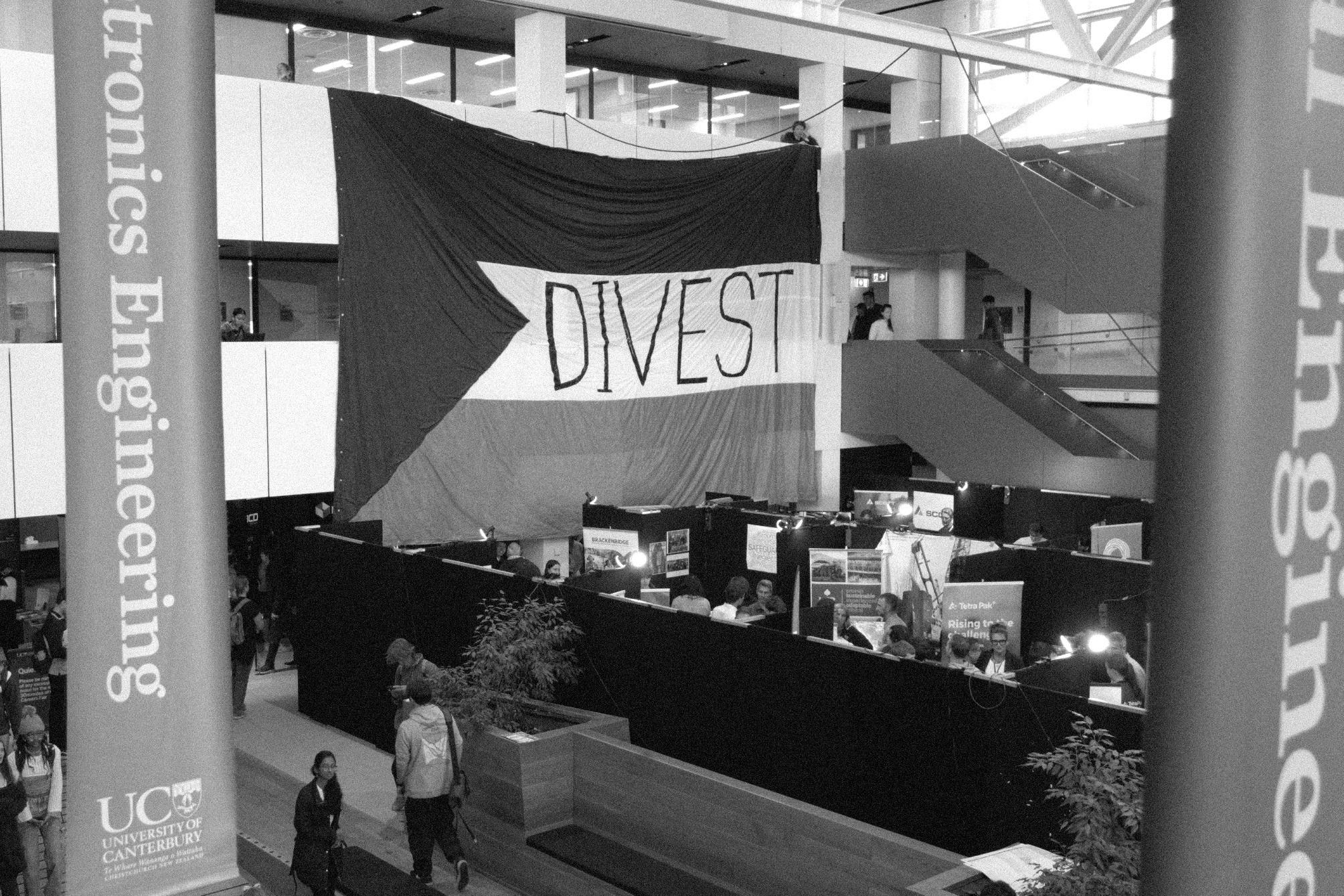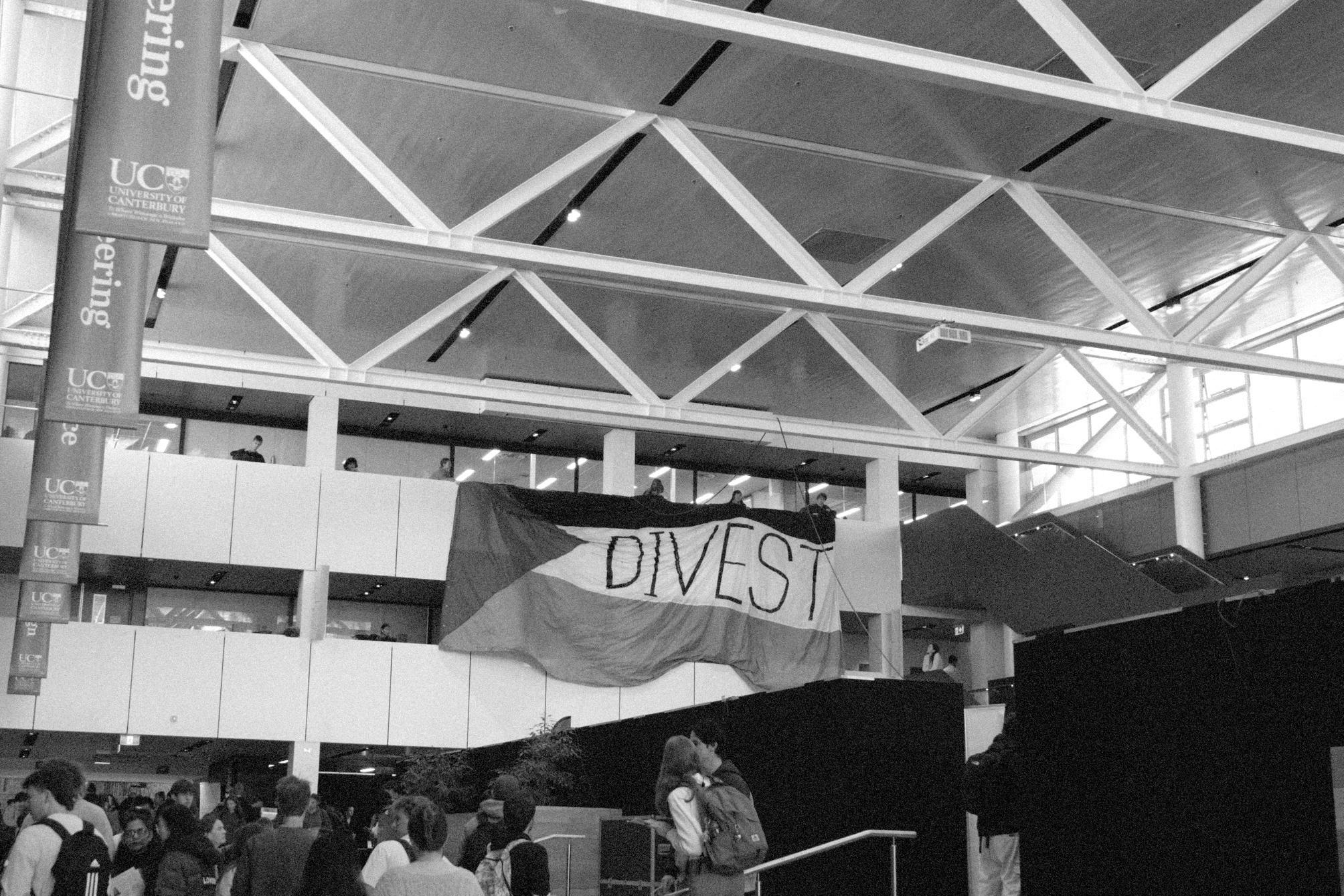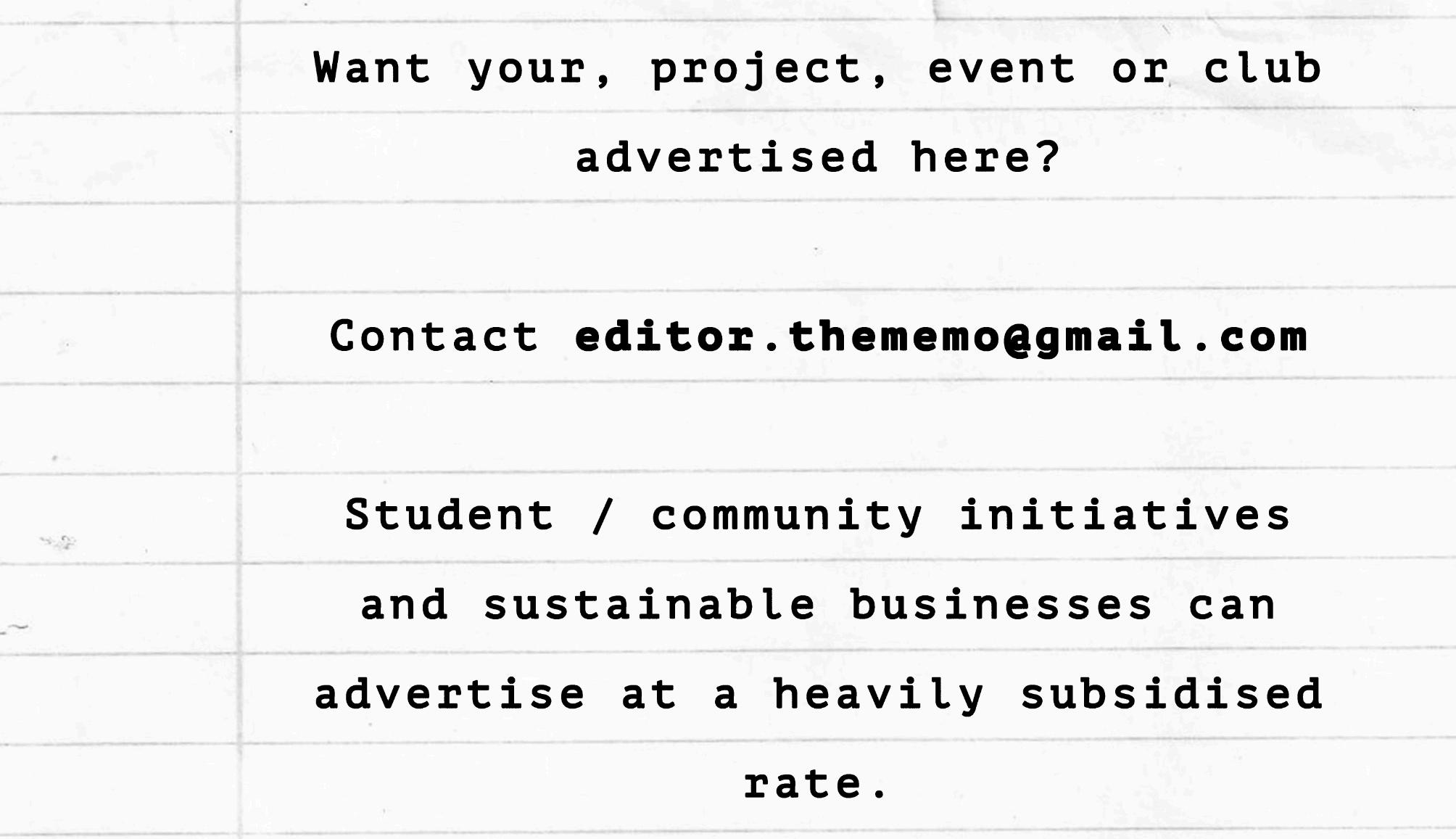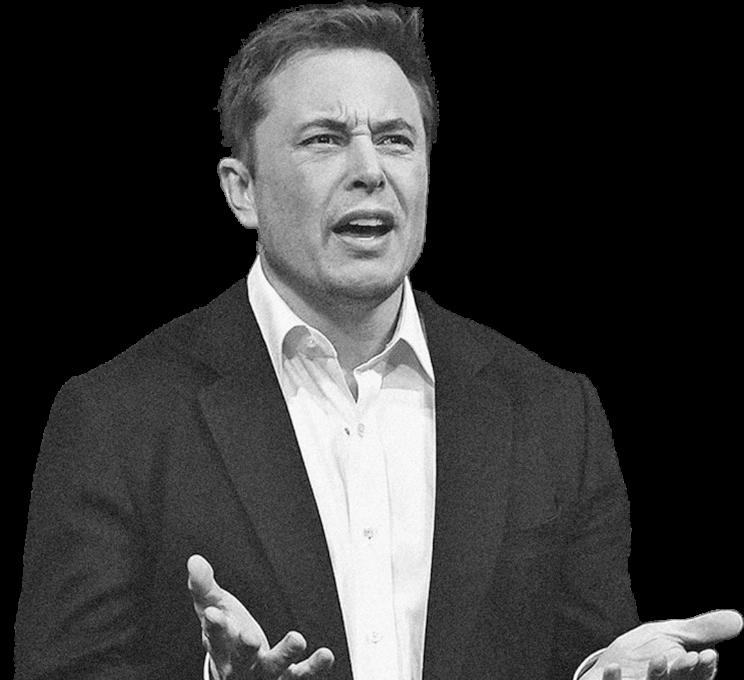MEMO.
TheMagazineofProgressiveandEnvironmentalWriting
STUDENT AFFAIRS
Ontherightsideof history:SJP’s advocacy(pg.4)

ENVIRONMENT


SellingoutAotearoa, onemineraldepositat atime(pg.10)
A JUST TRANSITION
RighttoRepair: changingthewaywe consume(pg.12)
JULY/AUGUST2024
NotefromtheEditor.
Ourvoicesmatter.Theimportanceofprintmediaand artinthefightforanequitablefuture.
ACULTURAL REVOLUTION TOOK PLACE IN 1968
Fifty-five years later, we find ourselves in a jarringly similar political situation to that of the students and workers who took to the streets of Paris in May 1968 and brought France to its knees. General strikes and mass protests held the government and their policies of austerity, as well as the senseless war in Vietnam, to account.
The echoes of that era resonate today, as people around the world rise against economic inequality, social injustice, and environmental degradation. The May '68 uprisings were not just political but were deeply intertwined with artistic and editorial movements. The underground press, poetry, and street art that helped drive the student rebellion became powerful symbols of liberation and resistance. These forms of expression fostered a collective consciousness, challenging the dominant narratives of the time. The role of these physical mediums is no less crucial in our digital world, where writing and creating art remain potent tools of resistance against the status quo. In an age of misinformation and censorship, the act of producing and sharing creative work continues to empower individuals and communities to question, challenge, and ultimately reshape society.
–
The Canterbury Memo is UC’s bimonthly magazine, showcasing a diverse array of writing and art from students and contributors beyond the campus. We advocate for a sustainable and equitable future by fostering an open dialogue where critical issues can be discussed openly and thoughtfully. By engaging in these conversations, we not only deepen our understanding of the impacts of these crises but also explore potential solutions at both the student and broader community levels. We aim to challenge the status quo, with the hope that the issues we write about today will become obsolete in five, ten, or twenty years. Such movements serve an urgent, albeit ephemeral, role in the fight for a better future. Each piece we publish plays a vital role in the ongoing
fight for a better future, sparking ideas and actions that can lead to meaningful progress. Now, more than ever, is the moment for such a movement.
This coalition Government has, and will, deepen the class divide. The fight for workers, Māori and youth justice must not falter as we face dwindling increases to the minimum wage, sanctioned benefits, and tax breaks for the owning class. What we’re witnessing now is the perpetuation of wealth inequality, at chasmic levels.
However, the fight is multifaceted; the legislative war waged on our natural environments by this Government will only further exacerbate the injustices and inequalities that transect modern Aotearoa. We must stand not only for people, but equally for the planet.
This is a call to action. We have the power to bring the country to a standstill, we can force those in positions of authority to listen. Student advocacy has become far more organised in recent times and we must harness this momentum. Unionise, rally, protest, read, write, create. It’s all resistance; the power of our voices is not tied to the electoral cycle. So get out there.As the students of the ‘68 uprisings said: la beauté est dans la rue. Beauty is in the street.
Joseph Davidson-Labout Editor-in-Chief
We do this because we think it’s important to advocate for the issues that matter; we are not affiliated to the University or the UCSA. The Canterbury Memo is run not-for-profit, relying on support from the community.
A truly independent and unfettered student-run press.
The Canterbury Memo would not be possible without the writers and artists who contributed their time to the project. Thank you.


OP-ED/STUDENTAFFAIRS/GAZA
TheRoadtoSolidarityandAction.
Howstudentactivistsstoodupforwhat’sright, protested,lobbied,andchangedUniversitypolicy.
COLLECTIVELYCONTRIBUTEDBYSJP
CANTERBURY



UC’s first major student protest movement in decades has won a substantial victory.
The University of Canterbury has spent months doggedly ignoring the latest phase of Israel’s genocide against the Palestinian people, even after Israel brought its atrocities to new heights after October 7. Individual, undirected, efforts have been taking place for months and years, to the credit of academics such as Jeremy Moses and Mahdis Azarmandi who’ve given substantial time and energy to the cause. Until recently, however, UC’s students have been largely disorganised. That was until May, when the University of Canterbury Students for Justice in Palestine (UC SJP) chapter kicked off. Only three months later, on the 9th of August 2024, UC’s Academic Board—the highest convocation of academic representatives at UC—voted 36-11 to endorse a motion to recommend immediate boycotts. This brings the University in line with the BDS movement and international law.
The Academic Board advises the Council of the University of Canterbury to:
1. Investigate and disclose University ties to identify any financial investments, research collaborations, or contractual agreements with institutions or corporations that are complicit in Israel's violations of Palestinian human rights and breaches of international humanitarian law.
2. Divest from corporations that are complicit in Israel's violations of Palestinian human rights and breaches of international humanitarian law. End any existing contracts with these companies and pledge not to enter into new agreements with them.
3. Suspend any academic or cultural collaborations with Israeli universities or other institutions that are involved in the development of military technologies or doctrines that contribute to Israel's violations of Palestinian human rights and breaches of international humanitarian law.
Now that this motion has been passed, it’s going to a future meeting of the University Council, the governing body of the University of Canterbury. This means that the SJP campaign is continuing. SJP needs the students of UC to stand up for what we all know is right—supporting the people of Palestine in their struggle against the
“Theytrytocrack downonstudent protest...”
bureaucratic-genocidal apparatus that calls itself the State of Israel.
SJP’s next steps come in the context of a surprisingly effective campaign in a very short timeframe. When the movement began in May, Israel had spent seven months trying to decimate Gaza. With over 30,000 Palestinians killed, a small group of UC students had had enough. The UC School of Engineering then chose to invite to its careers fair the New Zealand Defence Force, which at the time was deployed to “protect” the Red Sea trade route from Yemeni attacks against Israeli-flagged or Israeli-owned vessels. While the Israeli war effort’s top suppliers Lockheed and Northrop were absent, other military hardware manufacturers were there to recruit UC students.
In response, we dropped a 10 metre Palestinian flag at the careers fair as a sign of our solidarity with the people of Palestine. Beneath it, we launched our petition to call for the university to join the BDS movement. Despite this message to the University—that we would not accept its complicity in the genocide—we were ignored. With unprecedented support from students and faculty, we decided to deliver the message more forcefully.
On the 21st of May, we encamped in the Undercroft. The University immediately called on law enforcement to remove the students from a 24-hour study space, and locked access to every single building on campus. Not only did they try to crack down on student protest, they punished every student and faculty member on campus by preventing their access to lectures and study
spaces. On the second day of occupation, the Vice-Chancellor recognised the student protest and began negotiations. These resulted in small steps towards UC SJP’s demands, and in good faith we agreed to decamp on the agreement that BDS would be advanced at UC through other channels.
This began in June, with faculty members Mahdis Azarmandi and Jeremy Moses presenting a motion for boycott to the Academic Board, an elected group of academic representatives that reports directly to the UC Council.After an initial exchange of views between the representatives, the motion was refined to its key points, above, to be presented in August.
In support of the motion, we rallied at UC. We presented our petition in the form of a 100 metre long scroll with over 1,200 represented signatures on it. We brought the petition to the Matariki building, the seat of the Council and Vice-Chancellor, where it stretched around the Puaka-James Hight courtyard Puaka-James Hight several times over. Prominent local leaders spoke at the rally showing the overwhelming support for the movement, including local councillors, activists, and MPs.
In August, the refined motion was brought before the Board. With student supporters of SJP lobbying the representatives prior to the meeting, the motion passed almost three-to-one with 36
“Thiscampusisours, andwecanrepoliticiseit.”
academics voting in favour and 11 against. Despite this win, there’s a long way yet to go. TheAcademic Board vote is a strong statement to other universities across the country (such as the University of Auckland, where Vice-Chancellor Freshwater’s response was even more aggressive than UC’s and saw no engagement with the student body), and faculty support for the cause has not gone unnoticed. However, the Academic Board can’t implement the motion itself; that’s up to the University Council. SJP will be announcing rallies in support of the motion going
to Council, and other ways to get involved.
In the meantime, SJP asks you to have conversations on campus. Talk to well-informed friends, colleagues, and faculty, and ask them to get involved in supporting Palestine on campus. For the uninformed, show them the scope of the atrocities, tell them about the recent International Court of Justice judgement of July 2024 which found Israel’s 60-year occupation of Palestine to be a flagrant violation of international law. Remind them always that Palestinians are human beings, and that Israel has subjected every single one to forced displacement and apartheid. Israel is only able to perpetrate these atrocities and get away with it because it’s convinced ordinary people to look away, to ignore the truth. Every time you have a conversation about it, every time you persuade someone to take action, and every time you help someone get informed takes a little bit of Israel’s power away.
The death toll continues to rise. Some estimates suggest Israel has murdered over 180,000 Palestinians. The University of Canterbury grinds its heels and delays its recognition of international law; still it refuses to
condemn Israel and cut all ties. Students for Justice in Palestine will not give up. We’re absolutely determined that the Council will vote for conscience, as is its duty under law and morality.
Neoliberal reforms from the 1980s turned education into a product rather than a right, and turned students into customers on campus. But it doesn’t have to be this way. We students belong to UC, and UC belongs to its students. The campus is ours, and we can re-politicise it.
There are simple actions you can take to help the movement: follow us on Instagram to stay informed and updated, educate yourself on the atrocities happening in Gaza; we cannot lose focus on Israel’s apartheid and genocide, wear your support (if you can) with kuffiyeh, badges, and flags, and most importantly talk to faculty and tell them to push Councillors to vote in favour of the motion. Encourage people to stand on the right side of history.
Student for Justice in Palestine, Canterbury @sjp.canterbury


UCSAElectionResults. OfficialResultsofthe2024UCSAExecElections.
The student body has spoken. Driven by low voter turnout, this vote has solidified the status quo with incumbent President MacKay remaining in office for another mandate.
Luc MacKay received 2,366 votes, or 44.4% of the Presidential vote, an almost outright majority of the student body popular vote. Runner up Eleanor McEwen trailed almost 14 points behind.
WhatMatteredthisElection?
The rest of the 2025 UCSAExecutive team will comprise Jharmane Catolico as VP-Engagement who received 3,020 votes and Jenro Fortich as VPAcademic with 3,341, both of which received solid majorities over their opponents.
The position of Post-Grad Rep was secured by Olivia Welsh with a margin of 25 points while Nikhita Riches took Equity Rep with a relative majority, securing 37% of votes.
The roles of Pacific and International Reps were uncontested and went to the respective candidates with high levels of confidence (~10% blank votes for each ballot).
Of the 10 candidates who stood for General Execs, all but one were elected to either that or other positions.
Studentpollingfromthefinalweeksoftherace.
PollingconductedbyTheCanterburyMemointhe lead up to the election reveals growing dissatisfaction among the student population towards the UCSA Executive Team and a strong desireforchange.
Diversity, the environment, and wider advocacy were among the most crucial ‘big picture’ issues at the University when respondents were asked to identify the three most important issues to them. Many spoke of Gaza as being a key wider advocacy issue and played a large role in their dissatisfaction towards the Executive.
“Those elected to represent us should take our issues seriously. We are having to bring these issues to the university ourselves, they should be the ones raising our concerns at that higher administrative level” one respondent said.
“It took weeks of organised protest to achieve anything in the realm of Israeli divestment for
example, these types of issues simply aren’t being raised at the executive level. Our voices are not being represented.”
The recent increased mobilisation of student advocacy highlights the level to which the Executive have faltered on their responsibility to represent the interests of the student body (read: interview with UCSAPresidential Candidate Beaxtrix Gilling, p9).
Two-thirds of those surveyed responded negatively to the direction the Executive team was taking regarding the issues that mattered most to them.
Diversity being an important issue (identified by approximately half of respondents) helps make sense of the low perceived representation felt by students towards the Executive, with an overwhelming number of respondents feeling unrepresented by the UCSA. Less than 10% claimed that they felt represented by those elected to the UCSAExecutive team.



Structural changes to equity representation are a campaign promise of incumbent President Luc MacKay who secured re-election. MacKay's 2025 ambitions include the addition of representatives from “underrepresented cohorts”, mentioning LGBTQ+ and disabled groups as well as online students. According to UCSA figures published in CANTA, voter turnout in UCSAelections is some of the highest in the continent for student associations; despite this, turnout for this election was barely a quarter of the student population, at 26.11%. Our polling expected a far higher turnout, with the vast majority of respondents indicating a strong intention to vote in this election.
Notwithstanding the poll’s significant sample, there was clear bias in the subset of students surveyed.
While there was a clear desire for change, participationwaslow,withveryfewstudentsputting their names forward for the election, putting into question the accessibility of the system and general student awareness of the role of the UCSA and the way in which these elections work.
This opinion polling was carried out over two weeks between 22/7/24 and 1/8/24 with a statistically significant sample size of 107.

STUDENTAFFAIRS/INTERVIEWS/UCSAELECTION2024
StudentVoicesLeftUnheard.
ExclusiveinterviewwithUCSAPresidentialCandidate BeatrixGilling.
InterviewedbyJOSEPHDAVIDSON-LABOUT,13/8/24
While the UCSA Election came and went, concerns remain regarding the degree to which student voices are being truly heard and effectively actioned by the UCSA Executive Team. The election period brought a flurry of campaigns and promises, but the underlying question persists: will the elected leaders genuinely represent the diverse needs and aspirations of the student body, or will these voices once again be lost?
In the week leading up to the election, as students prepared to head to the ballots and cast their votes, I had the opportunity to speak with Beatrix Gilling, a President-elect hopeful who offered
“Therewasno submissiontoeither oneofthosewhichI foundpretty abhorrent.”
critical insights into the current issues plaguing the UCSA. She shared her vision for how she would address these challenges if given the chance to serve in office. Gilling’s candid discussion highlighted the frustrations many students feel about the existing communication gaps and the perceived lack of transparency within the UCSA, as well as her commitment to bridging these divides and implementing meaningful change during her tenure.
UCSAfailure:CouncilLTPSubmission
Gilling was shocked to learn that the UCSA had not made a submission on the Christchurch City Council’sandEnvironmentCanterbury’sLongTerm Plans on behalf of the student body. “There was no submission to either one of those which I found pretty abhorrent”. Gilling cited this as a primary motivator to run for the Presidency.
The UCSA, whose role is to represent the
interests of the student body, should be taking the initiative to bring forward these issues to central and local government in the form of submissions and deputations, argues Gilling.
TransparencyintheUCSA
Gilling discussed the lack of transparency with the processes and internal dialogue within the students’ association, noting closed door meetings being used to discuss important issues that pertain to students. Whilecloseddoormeetingsmaybenecessaryto deliberatesensitiveissues,theinformationdiscussed shouldeventuallybedeclassifiedandmadeavailable to students, she argued, saying that “students need to know what’s happening”. This barrier perpetuates the issues of poor communication between the student body and the UCSA.
AdvocatingforStudentVoicesbeyondCampus
GillingoutlinedaplanfortheUCSAtobringstudent voices to central and local government which would help bridge the gap between the association and the student body. Changing zoning rules for higher
“Studentneedtoknow what’shappening.”
density housing in Riccarton and Ilam to allow for affordable city living for students and young people was one of the key issues Gilling was keen to campaign on to council. This tied into her motivation to get into politics and ultimately run for theUCSApresidency,havinga“visionofwantingto live a dignified life”.
Gilling came third in the Presidential race last month with 11.5% of the popular vote and was popular among progressive electors.
NATIONALINTEREST/ENVIRONMENTALISM
“Dig,Baby,Dig!”
ShaneJonesandtheHorsemenoftheApocalypse: corruption,collusion,environmentaldestruction.
JENNAKELLY


It’s a clear, sunny day in the forested hills of the Wharekirauponga Bush. Birdsong fills the air, creatures scurry on the forest floor; all is calm in the conservation park. That is, except for the rumble of the earth, the creaking of heavy machinery and the hum of the massive ventilation shafts.
This is the future of a massive portion ofAotearoa’s natural beauty under the Fast-track Approvals Bill. Just one of many projects to be considered, the Wharekirauponga gold tunnel threatens the worldrenowned biodiversity of Aotearoa. The cracks are showing in the flawless, environmentally pristine imageweprojecttotheworld,trampledintothemud by the current National coalition government. Leading the charge are three prominent figures of environmental degradation: Shane Jones, Minister for Regional Development. Simeon Brown, Minister
for Transport. And Chris Bishop, Minister for Infrastructure.
WhatistheFTA?
The Fast-track Approvals Bill is posited as a ‘one stop shop’ for companies to bypass any and all environmental protections previously fought for by environmentalists across Aotearoa. It goes a step beyond already existing fast track processes by completely removing the need to apply under multiple environmental protection acts. Projects considered to have regional or national significance are received by the three above ministers, with the minister for Conservation dealing with Wildlife Protection Act approvals, and the minister for the Crown Minerals Act for ‘relevant decisions’. These are then referred to an expert panel for review, which, unsurprisingly, is appointed by these
ministers, however the panel’s advice may be disregarded. On top of this, regional council approval is irrelevant. And public opinion? Meaningless. The irony of projects with national significance having no public input is rather jarring.
But there’s a catch. Some projects cannot be fast tracked, such as projects proposed on Māori customary land or marine areas, or land returned under a Treaty settlement. This is excellent news, protecting the land of mana whenua. That is, if the government wasn’t set on heavily restricting customary marine titles for iwi and hapū. The recent move to overturn the foreshore and seabed decision will expose more land to the risk of international money-grabbers, further alienating the voices of mana whenua in important decisions that impact all of us.
This blatant attack on democracy named the Fast Track is an escalation of what some are calling the war on nature. As if our government didn’t already have a bad rap, this act furthers the disregard for our environment, for Te Tiriti o Waitangi and for the future generations of Aotearoa. In their relentless pursuit of profit, this government has discovered yet another route for undermining our voices and rights.
Not only does this act allow environmentally destructive projects to be approved with little research into their impact, but old ‘zombie’projects shelved due to council rejection or public disapproval can be looked into. The way in which projects are considered will be fundamentally shifted, with concern for the environment shoved aside to make room for economic gain.
TheThreeHorsemen
So who are the men holding our country’s fragile futureintheircarelesslyclenchedfists?ShaneJones, the current minister for Resources and Regional development, has ties to both the fishing and mining industries. He has been under scrutiny for undeclared meetings with mining company managers, passing them off as mere dinners between acquaintances. One would think a minister holding the access keys to Aotearoa’s juiciest mineral deposits might choose his dinners wisely, so as not to seem biased. That must be the nostalgia for real democracy talking. Jones has also attracted the attention ofAJR Finance, a generous political donor of $55k to the NZ First party in 2023. It probably has nothing to do with the company’s director’s links to a quarrying company vying for fast track approval.
Let’s not forget the ‘Shane’-ful “goodbye Freddy” nod to the potential for this act to destroy
conservation land, when he hammered home the point that not even an endangered ‘blind frog’would stop companies approved under this act. According to this government, nature does have a price on it. Conservation land, national reserves and protected coastal areas are not being treated as the lifesustaining taonga they are.
Joining him are two other ministers with questionable priorities. Between Simeon Brown’s transport policies being an exercise in how many roads one can build and Chris Bishop’s furtive past as a tobacco lobbyist, it’s no wonder 20,000 people marched in Tāmaki Makaurau recently in June. Ignoring science appears to run rampant in the National party, as Brown has previously been criticised for the decision to reinstate higher speed limits, despiteevidencethatthis increases pedestrian deaths and transport emissions. If it doesn’t have a dollar value, he isn’t interested.
What’sNext?
This Bill will affect all of us. Directly, our natural spaces, both on and offshore, are under threat. With littletonocouncilandpublicinput,minimaltimefor comprehensive research on proposed projects, and a disconcerting lack of good intentions, the Fast-track Approvals Act is truly a disaster dressed in blue. Beyond this, this act reverses vital steps taken towards mitigating climate change, at a time when we are already seeing the effects of warming take hold. Even the prospect of hundreds of millions of dollars in damage doesn’t seem to sway these ministers on their relentless pursuit of growth. The idea of future-planning is as alien to them as sitting on a bus.
In the face of such a backwards, morally bankrupt government, we need to keep our eyes on the future, to have hope in these despondent times. The louder our voices are, the further they carry. The government only has as much power as we give them; we can use our votes and our voices to demand justice for our country. We can speak up–write to the Government, to local MPs, to councils, to newspapers, and refuse to be silent about the things that matter to us. We can mobilise - take action against this Bill, defile its image for companies and let them know we want no part of this approvals process. At this moment in time, our environment matters more than any economic gain. As many people have said before, there’s no economy on a dead planet.
SOCIETY/ENVIRONMENTALISM/JUSTTRANSITION
TheRighttoRepair
Tackling
over-consumption
andglobalwasteby targetingmanufacturers,awin/winforconsumersand theplanet.
BEDEMILLER
One hundred thousand tonnes—the amount of e-waste New Zealand generates annually. One hundred thousand tonnes is the equivalent of twenty kilograms of e-waste created by each citizen and it is projected to reach nearly thirty kilograms by 2030. As per the International Telecommunication Union, NZ sits among the highest per capita producers of e-waste and has one of the lowest recycling rates. This staggering statistic underscores the massive problem of our throwaway culture, driven by increasingly costly repairs and outright unrepairable devices. The right to repair is a crucial step we can take toward addressing NZ's e-waste crisis. It is a step that empowers consumers to have their say in keeping their devices going longer, reducing their waste, and pushing back against those companies that make repair so challenging.
TheRighttoRepair
Simply put, the right to repair is the concept that you - the owner of a piece of equipment, be it a smartphoneoratractor,shouldhavethelegalright to upgrade, modify, or repair it yourself or through a third-party repair shop, without intervention or consequence from the manufacturer. The right to repair intends to ensure that the manufacturer makes the parts and information on how to service a device available, enabling consumers to repair the product themselves. However, this does not mean manufacturers are liable for consumer modifications or poorly donerepairs.It'snotaboutcompromisingsafetyor legal standards, either. It ensures that if a company wants to reject a warranty claim on the basis that you opened the device to repair it and may have caused the damage yourself, the onus is on the company to prove that your repair caused the issue.
SituationinAotearoa-NewZealand
As of publication, New Zealand desperately lacks any right to repair adequately entrenched in law. What New Zealand does have is the Consumer GuaranteesAct 1993, which entrenches numerous rights a consumer has when purchasing a product in New Zealand. While the Consumer Guarantees Act is better than nothing, it has a gaping loophole that allows manufacturers to opt out of offering spare parts to consumers.
But there is hope in the growing support for
“Onehundred thousandtonnes—the amountofe-waste
NewZealandgenerates annually.”
the right to repair. At the end of August, Consumer NZ delivered a petition to parliament with over 21,000 signatories backing the introduction of repairability labels on household appliances and electronic devices. These labels would aid consumers in making an informed choice to purchase more repairable products.
Another hopeful outlook for the right to repair is "The Consumer Guarantees (Right to Repair) Amendment Bill," introduced in April 2024 by Green Party Co-Leader Marama Davidson on behalf of the Green Party. If passed, this bill would "empower consumers with more of a right to repair their products, minimising waste, and reducing costs," and it "would require manufacturers to produce repair parts and provide resources to allow consumers to extend the life cycle of the products they use."
E-WasteandtheEnvironment
While they're not entirely on the same level as big oil, the resource-heavy nature of electronic production puts the tech sector on the higher end in contributing to climate change. But it's not just climate change; it's the growing amount of ewaste that contributes not only to rising emissions but causes massive local environmental issues.
These local ecological issues stem from the toxic nature of e-waste and its often poor management. In New Zealand, as of 2017, not only is e-waste the fastest-growing poisonous waste stream, but virtually nothing has been done to combat it. Right to repair legislation is a considerable step New Zealand can take toward addressing the environmental concerns of ewaste. Entrenching the right to repair into law would encourage the creation of better-built and more repairable products.
Products consumers would be able to repair, increasing their usable life and drastically reducing the quantity of electronics becoming ewaste as soon as they are deemed unrepairable.
ComplicityofManufacturers
Over time, electronics like smartphones, laptops, cars, and even tractors have become increasingly challenging to repair. This is a vast difference from older versions of that equipment, which owners could fix themselves with the proper knowledge or willingness to learn.
This shift in repairability is driven partly by planned obsolescence, a strategy in which a business intentionally designs products to be less durable or more complicated to repair. This strategy encourages consumers to buy new ones instead of overpaying for costly repairs—if they even can be repaired.
Manufacturers will argue that certain design choices are necessary to improve performance or reduce size in some product segments, such as laptops and smartphones. However, these 'advancements' tend to come at the cost of the device's repairability.
BeyondtheRighttoRepair
The right to repair is more than just a consumer right;it'sessentialtobuildingasustainablefuture. As e-waste piles up, the power to reduce, reuse,
COLUMNS
RequiredReadings
Thisterm’srecommended readingsfromtheMemo Editorialteam.
CradletoCradle:RemakingtheWaywe MakeThings
WILLIAMMCDONOUGH&MICHAELBRAUGART,2002
A crucial piece of environmental writing that challenges the traditional linear model of manufacturing and supply chains, advocating for an approach where products are designed with their life cycles in mind.
The book provides the foundation for modern circular economic thought, by rethinking how we create, consume, and dispose of goods. Much of it remains relevant in contemporary environmental discourse and when discussing economic reform for a low carbon, sustainable future.
ALeftthatDarestoSpeakitsName SLAVOJŽIŽEK,2020
A contemporary compilation of essays that dissect the political and socio-economic issues that have arisen as a result of late-stage capitalism.
His wide-ranging analysis of intersectional politics calls for a Left that is united with a collective identity and agenda.
and repair becomes a necessity. Entrenching the right to repair into law would empower consumers to join the broader movement to combat the casual throwaway culture threatening our environment.
As Pete Seeger once said, "If it can't be reduced, reused, repaired, rebuilt, refurbished, refinished, resold, recycled or composted, then it should be restricted, redesigned, or removed from production." We must strive to create a world where repair is the norm, not the exception.
INTERNATIONAL/PARISOLYMPICS
TheDisinformationGames. The
Olympianfightingforthetruthagainstsocial medialies.
TAREKPATCHETT
Citius, Altius, Fortius – Communiter; Faster, higher, stronger – Together. The Olympic games are a shining example of international cooperation, cosmopolitanism and a chance for each participating nation to celebrate its athletes on a global stage.
As Imane Khelif stepped into the ring with Italian Angela Carini on the first of August, the online community had little knowledge of the Algerian boxer prior to the 2024 Paris Olympics.
These games were supposed to be the culmination of her hard work up to this point, and something to be celebrated.
Her match lasted all of 46 seconds before her opponent Carini withdrew citing safety reasons. What followed was a defamatory campaign against Khelif’s character, rife with disinformation about
her gender identity, which capitalised on brewing anti-transgender rhetoric on social media platforms.
However Khelif is not a transgender athlete. At least not to the best knowledge of her father, the International Olympic Committee (IOC), and Khelif herself.
This accusation resulted from a failed gender eligibility test administered by the Russian-led International Boxing Association (IBA), which claimed to prove that Khelif had XY—male— chromosomes. The IBA, however, was stripped of its governing status in 2019 over ethical concerns, so thereisconsiderabledoubtoverthelegitimacyofthe failed test.
Her father,Amar Khelif confirmed in a statement that Khelif was assigned female at birth and was raised as such, “My child is a girl… was raised as a girl”. The IOC maintains a similar position, stating








“scientifically this is not a man fighting a woman.”
Khelif has been outspoken about the challenges she faced in her childhood on account of her gender.
“I came from a conservative region and family. Boxing was a sport dedicated only to men”
Achieving her Olympic dream against these odds could have been a defining moment of the Paris
“MuskandRowlingare amongthepublic figuresmentioned.”
games but was instead tarnished by a widespread misinformation campaign
Thespreadofmisinformation
Taking to X (formally Twitter), popular and controversial children’s author JK Rowling falsely claimed that Khelif was transgender and a biological male abusing the system.
“A young female boxer has just had everything she’s worked and trained for snatched away because you allowed a male to get in the ring with her.”
Mainstream media was also not immune, with Fox News in the States aired numerous contentious segments, claiming that “a woman is going to die at some point”. While the Boston Globe was forced to apologise for a headline incorrectly stating Khelif was transgender.
Further criticism was levelled at Khelif by international political leaders, including Italian PM Giorgia Meloni, US Republican Vice Presidential candidate JD Vance and even Aotearoa/New Zealand’s own Winston Peters. The Deputy Prime Minister and Foreign Affairs Minister wrote on X that the fight was a “shocking example of why biological men should not compete in women’s sports”. Peters sharing disinformation is concerning, given there was no clear attempt by him or his staff to check the validity of his statements.
The European Commission found in a study of X analytics that algorithmic changes had actively promoted the spread of misinformation and disinformation by verified accounts. These changes occurred following its acquisition by Elon Musk in late 2022.
On his reasons for buying out Twitter, Musk stated he wanted “civilization to have a common digitaltownsquare.”Forthoseunfamiliar,thepublic sphere, or digital town square, is a fundamental part of allowing open discussion in a democracy and
holding establishments to account.
The Centre for Countering Digital Hate (CCDH) found in a study that the use of slurs against members of the Black and LGBTQ+ communities increased by nearly 300% and 60% respectively on XfollowingtheMusktakeover.Ifthiswashisvision for an online public sphere, he has succeeded. Disinformation can spread rapidly through unrestricted algorithms.
Whatcanbedone?
Khelif has remained composed throughout her ordeal and recently submitted a criminal complaint to French authorities over acts of “aggravated cyber harassment.”
Her lawyer Nabil Boudi states that the lawsuit, while filed in France, “could target personalities overseas.” Musk and Rowling are among the public figures mentioned in the case.
Accountability helps ensure justice for Khelif, who has had her credibility questioned on a global stage. While the outcome of potential legal proceedings is unclear, Khelif has the comfort of an Olympic gold medal. No one can take that away from her.
ItisimportanttorememberthatwhileKhelifdoes not identify as transgender, the social media backlash largely stems from an anti-transgender sentiment. This content should be condemned as public spheres, online or not, should promote safe discussion. Therefore, it is vital to call out harmful disinformation and to think critically before resharing information online. As Khelif experienced,
“Wedeserveleaders whoseektoinformand uplift.”
real people are affected by these sentiments. Reducing the spread of disinformation is complex but means holding public figures to account when necessary.
As journalist Louisa Wall puts it “We deserve better from our public officials; we deserve leaders who seek to inform and uplift, not those who spread falsehoods for political gain.”
Doing so means the memory of the Olympics can be of sporting success, and not a legacy of lies and abuse.
MEMO.
TheCanterburyMemoisUC’s student-runbimonthlymagazine featuringwritingandartthat advocatesforaprogressive, equitableandsustainablefuture forAotearoaandtheworld.
Webelieveprintedmediaandart toberesistanceagainstthe harmfulstatusquo.
Wehavealimited,free, printrun aroundcampusandatselect spotsinthecentralcity.Wealso makeallissuesavailabletoread onlinethroughoursocials.
Informationaboutfutureissues anddistributioncanalsobefound onoursocials.


FollowTheMemo onInstagram, sendusa messageto contributeandto getinvolved
